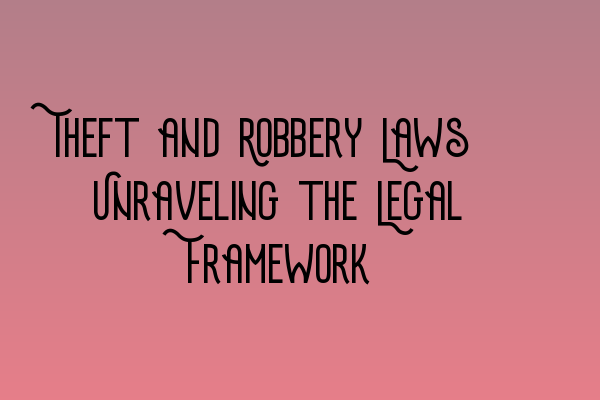Theft and Robbery Laws: Unraveling the Legal Framework
Welcome to the official blog of SQE Criminal Law & Practice Law UK. In this article, we will dive deep into the complex legal framework surrounding theft and robbery laws. Understanding these laws is crucial for aspiring solicitors, law students, and anyone interested in criminal law. So, let’s begin our exploration!
Theft Laws: An Overview
Theft, a crime that has been committed since time immemorial, involves taking someone else’s property without their consent. This act is against the law and can result in severe consequences for the offender. To grasp the concept of theft laws better, let’s break it down further:
Elements of Theft
To prove a theft offense, the prosecution must establish the following elements:
- Appropriation: This refers to the act of taking someone else’s property.
- Property: The item or belongings that are subject to the theft.
- Belonging to Another: The property must belong to someone other than the accused.
- Intent to Permanently Deprive: The accused must have the intention to permanently deprive the owner of their property.
These elements serve as the building blocks of theft laws and form the basis for prosecuting individuals involved in theft crimes.
Consequences of Theft
Depending on the circumstances and severity of the offense, theft can be categorized as either a summary offense or an indictable offense. Summary offenses are relatively less serious and may result in fines or community service. On the other hand, indictable offenses carry more severe penalties, including imprisonment.
It is important to note that each theft case is unique, and the court considers various factors, such as the value of the stolen property and the presence of aggravating factors, when determining the appropriate punishment.
For more information on the legal implications of theft, please refer to our SQE 1 Practice Mocks FLK1 FLK2 article.
Robbery Laws: An In-depth Look
Robbery, a more severe offense than theft, involves taking someone’s property through the use of force, threat, or intimidation. Unlike theft, robbery is a crime against the person as well as their property. Let’s delve into the specifics of robbery laws:
Key Elements of Robbery
To establish a robbery offense, the prosecution must prove the following elements:
- Theft: The act of taking someone’s property.
- Force, Threat, or Intimidation: The property must be taken using force, threat, or intimidation, making it a more serious offense.
- With Intent to Steal: The accused must have the intention to permanently deprive the owner of their property.
- Against the Person: Robbery involves the use of force or intimidation against the person in addition to the theft.
To be classified as robbery, the offense must meet all the aforementioned elements. In the absence of any of these elements, the offense may be classified as theft or another related crime.
Penalties for Robbery
Robbery is considered a serious offense due to the presence of force or threat against the victim. It is typically treated as an indictable offense and carries severe penalties, including lengthy imprisonment.
As with theft, the court takes various factors into account when determining the exact punishment for a robbery offense. These factors may include the nature of the force or threat used, the value of the stolen property, and the impact on the victim.
If you would like to learn more about robbery laws and their implications, please refer to our SQE 2 Preparation Courses article.
In Summary
Theft and robbery laws form an integral part of criminal law, and understanding their intricacies is essential for legal professionals and individuals interested in the subject. The legal framework surrounding these offenses is complex, with various elements and factors to consider.
If you are preparing for the SRA SQE exams and would like to test your knowledge of criminal laws, we recommend checking out our SQE 1 Practice Exam Questions article. It will help you assess your understanding and identify areas for improvement.
For more information about SQE preparation courses or the upcoming exam dates, please visit our SRA SQE Exam Dates and SQE 1 Preparation Courses pages.
Thank you for reading this comprehensive article on theft and robbery laws. We hope it has provided you with valuable insights. Stay tuned for more informative articles from SQE Criminal Law & Practice Law UK!
